Our wonderful guest blogger, Jessegirl is back with another insightful article discussing the symbolism of the bars and birds, found frequently in the film.
by Jessegirl

Symbolism abounds in Remember Me. The question is, how much is deliberate and how much simply exists, lying in wait for not only the viewer, but also the filmmakers, to find? For example, the Seurat print on the inside of Tyler and Aiden’s apartment door is seen again when Caroline goes to the gallery with her father in the final montage. And, because we see it a number of times in Tyler’s place and he even seems to be staring at it when he tells Aiden they’ve really got to fix the deadbolt, the print seems to have some significance. However, we learn in the DVD commentary that the picture on Tyler’s door is CGI and was put in later, after they’d decided Caroline would be looking at the Seurat at the gallery. So, no meaning particularly?
There is a lovely analysis of this print on the bilingual Remember Me site:
Regardssurlefilmrememberme.blogspot.com (“The Seurat Portrait in Remember Me”: June 3, 2010).
The set designer took great care with the over-all look and also with the myriad details in the apartment and with the sets and period detail in general. [Kudos to Scott P. Murphy.] Physical details had to be realistic and provide continuity. But, do any of the objects in Tyler’s apartment, or Charles’ office, have meaning beyond that? If the Seurat wasn’t chosen for some meaning, what about the other items?
Let’s explore some of these details and see what happens, what occurs to us.
I’ll start with how often Tyler is placed visually behind or in front of bars.
Tyler is, we know, a conflicted character. The battles going on inside of him are provocateurs. He hears Michael’s name being called in an alley and is primed for a fight. He feels guilt for using Ally—at Aiden’s instigation—and provokes Neil Craig to beat him up. His conflicts with his father are ever present.
It is no wonder that his short fuse lands him in jail. He almost relishes the mess he’s gotten himself—and Aiden—into, when Craig hauls them to jail after the street brawl. Aiden calls him nihilistic and Tyler shrugs off his friend’s concerns. Tyler is trying on nihilistic behaviour for size. He’s playing at it. It’s a joke to him. In so many ways, it seems like Tyler really doesn’t care, that he is sort of submitting to fate. He’s poking at fate, testing it, in these early scenes. So there he is, a prisoner, behind bars, goading the other prisoners from the safety of his own cell. “Pussies,” he taunts.
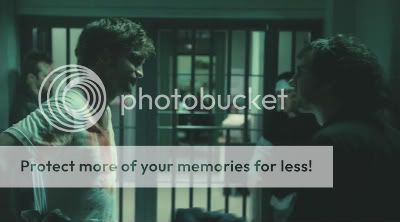
Then, much later, Tyler enraged Craig on purpose by offending him. “I only did it for a bet,” he says to Ally’s Dad, a man obviously already on the brink of violence. Tyler wants to be punished so badly because he feels guilty for his treatment of Ally. And Ally’s Dad is just the man to mete it out. The perfect man for this particular sin, actually. At first Tyler makes an attempt to defend himself; he grabs Craig’s hair. Then we see Tyler visibly fearful as Craig starts choking him and Tyler slides down the wall in defeat. The tough cop is physically stronger than the lanky kid so this retribution was easy to apply.
Where the heck are the bars, you wonder? Well, mostly they are the invisible but real restrictions inside himself. Tyler chooses them because, after his brother’s suicide, he feels he does not deserve to be free. When Craig leaves, Tyler pounds the floor in anguish, then, sits in a chair, in despair. We see him from the room beyond and he is behind the flimsy beads hanging in rows, which form a veil of bars in front of him. So this particular atonement did not set Tyler free.

Granted this instance of ‘bars’ might seem like a stretch. However the DP, who frames subjects in doorways or windows, chose to show us Tyler behind the curtain of beads.
Style or meaning? Regardless, we see Tyler, once again, behind ‘bars.’ And we don’t need a visual reminder that he is a prisoner of his own self-loathing. Because this boy is getting prepared to face Ally herself.

Well, there he is, anxious and miserable, behind bars. He awaits her, watching for her return from behind the diamond-shaped bars across his window. The symbolism here is obvious. He can no longer shrug it off because, no matter what his words to her, he wants to be shriven. Things matter to him now. His journey has become fraught with the difficulty of love. Her reaction matters to Tyler. He doesn’t want to lose her.
We only see Tyler behind bars once after this, but that comes much later.
There are times when we see Tyler in front of bars. All these times signal the beauty of his relationships. Granted the ‘bars’ are ordinary things which just happen to be shaped like bars, and one can find many objects which do this.

In this beach house scene, we clearly see his tender love for Ally. Everything about his body language and the poignant expression in his eyes here shows that he is now invested in life and this woman has done that for him. It is not just romance; it is rescue. Now Tyler is really on his way to freedom from his demons. Where are those bars? The window behind him, and here they are white, bleached and benign. This was one of those brief interludes of tranquility.

The porch scene again shows bars, bars, behind them.
Even though Tyler and Ally have yet to reconcile, they love each other and they will work through it. Tyler is always relating to someone when the bars appear behind him; even if it is difficult, he is trying.

Oh, Caroline, life-line! Bars behind, yes, and here the big brother is relating without baggage, as he does with no one else. These two are simpatico; they are each other’s safety net. After acknowledging his sister’s problem with her classmates, Tyler distracts her with a wonderful gift—the book--and with his sweet ‘French’ talk.
Did you notice the Picasso poster at the beginning of this post? There is a prisoner, behind bars, and a white dove in front. Now we will see how the bird symbols and the bars come together. Actually, this poster says so much all by itself. How does this poster fit in? Did you notice it in the film? It is there, along with another Amnesty International poster, in Tyler’s apartment. Just as with so much in this film, it is unobtrusive because symbol must never be obvious. It never gets in the way of the story or the characters, but it is there, and it appears at a significant moment.
The following screencaps show us.

After the explosive boardroom scene, Tyler returns, feeling impotent and defeated. Here he leans in towards Picasso’s poster; he is stumbling and sagging, his battered ego finding no purchase.

And now he slumps and rests his head against the wall, his forehead making contact with the prisoner’s face on the poster. Exactly there. He feels vanquished.
(I don’t think he left that boardroom defeated, but that is another story.) Ally’s hand on his shoulder tells us all we need to know. She will comfort her man. –And of course they have angry sex—which is yet another story. But the point here is that Picasso’s magnificent print explains Tyler’s despair. Still a prisoner. Still behind bars. It will take more than the love of a good woman to free him. We know that.
Sure enough, before long Tyler has been arrested yet again. In an attempt to defend his sister from bullies, he strikes out mindlessly in her classroom. But this time, unlike his incarceration at the beginning of the film, this time Tyler is the hero. And his father thinks so. This time he and his father work together.
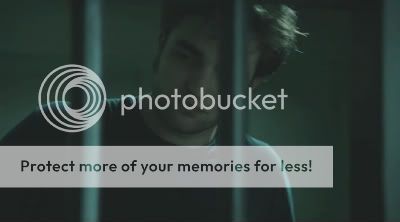
And this time, when his Dad bails him out, Tyler thanks him. Here we see him behind bars again, but so much has happened since the last time he was in jail. He doesn’t know it in this photo, but he has his father’s approval, and that will make all the difference.
And now, freedom.

Why does Tyler make a bird shadow silhouette on Ally’s back? Just a game? Not in this movie.

On
Regards sur le film Remember Me.blogspot.com Tyler and Ally on the Last Morning the creator has written a poignant poem about this moment, in which she suggests that Tyler ‘knows’ he will die that day. I had come to a similar conclusion as well. The bird symbolizes Tyler’s soul flying away. His knowledge would be subconscious precognition and he would not really be aware of it, of course. But the significant thing is that this particular bird is more foreshadowing of his coming death. It is an actual shadow.
Birds. Tyler’s hand shadow could also be an airplane, couldn’t it? Look at it. It is the ominous herald, its wingspan much larger than the dove of peace on the Picasso. The dove of peace, of hope, of love, and the ‘bird’ of terror, the plane ramming into the North Tower in which Tyler later stands. There he stands, for the last time behind ‘bars’
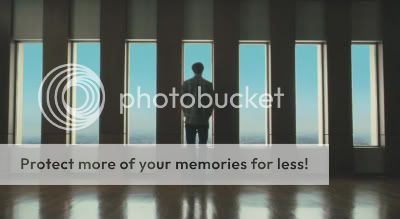
It is ironic that Tyler’s posters—he has the other Amnesty poster with the orange corona as well—emphasize freedom from oppression and that he is killed by terrorists whose raison d’être is the spread of oppression. So his unspoken political stance is diametrically opposed to that of the terrorists. (And it is significant that on two occasions Tyler and Ally begin to make love by the posters.) Regardless of Tyler’s youthful, unfocused run-ins with the law, he is a peaceful, loving man, the polar opposite of those who murder him. And he wants to be free.
Picasso’s dove of peace is always there, in Tyler’s hallway, symbolically freeing the prisoner, Tyler, from his internal demons.
Whether all this symbolism was cunningly planted in the set design of the film or not, whether we see them at first, or not, all these bars and birds show us what a rich, layered construct Remember Me is. It says so much just by implication, and we see it only after the first force of the movie has done its work.
And we know Tyler flies away at the end, free, and all bars fall away.
“And flights of angels..."
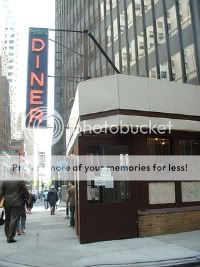



















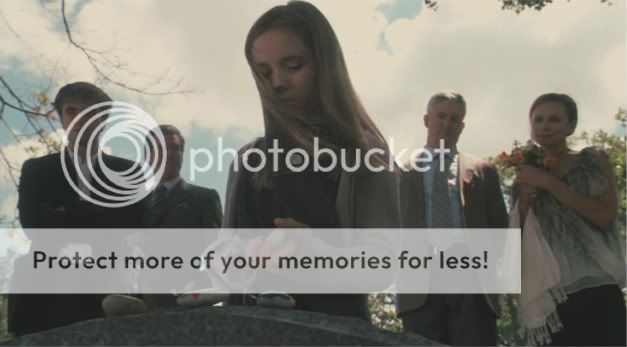










 Regards sur le film Remember Me
Regards sur le film Remember Me ...Remember Me Saturday
...Remember Me Saturday ...Spunk Ransom
...Spunk Ransom ...Let Me Sign
...Let Me Sign ...Thinking of Rob
...Thinking of Rob ...Emilie de Ravin Fan
...Emilie de Ravin Fan ...Dedicated to Emilie Blog
...Dedicated to Emilie Blog ...Gregory Jbara Official Web Site
...Gregory Jbara Official Web Site ...Respect Robert at LetMeSign.com
...Respect Robert at LetMeSign.com